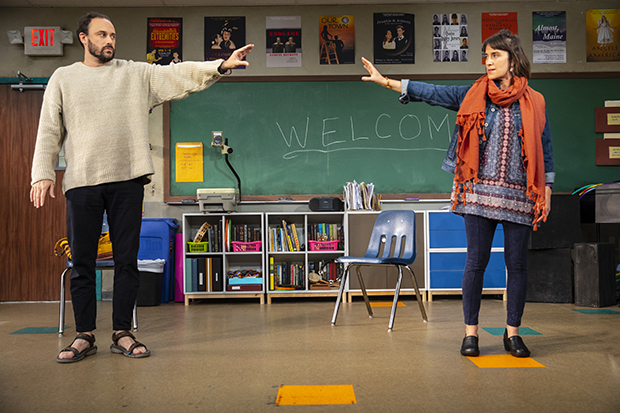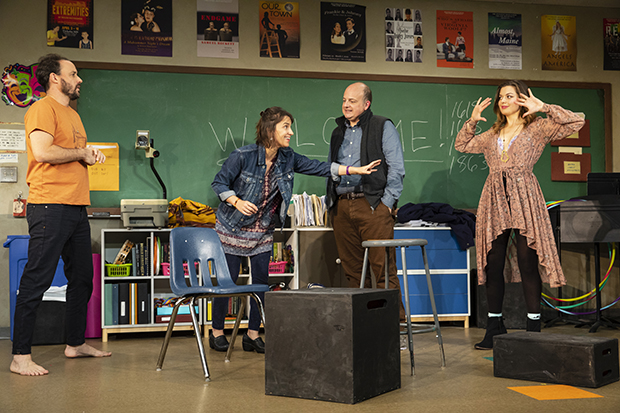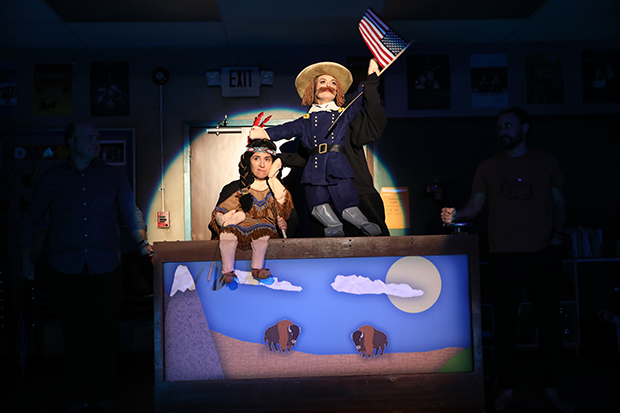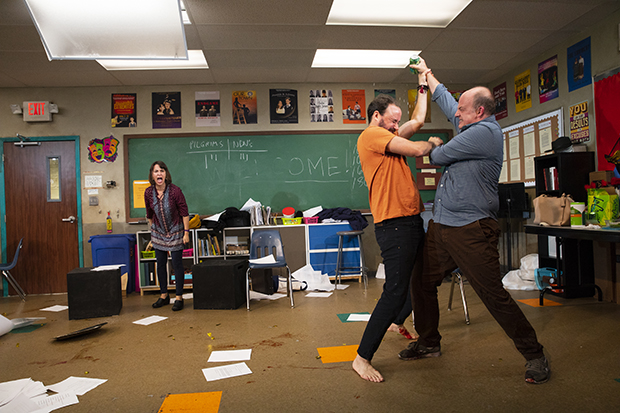Good Intentions Gone Awry in The Thanksgiving Play

(© Joan Marcus)
Logan and Jaxton have bought wholeheartedly into a lifestyle that looks exhausting: Wearing only second-hand clothing and eating only locally sourced food, they navigate a daily minefield of triggering behavior and microaggressions, ever mindful to check their privilege. As Jaxton hands Logan a new water bottle, he remarks, "It's made with recycled glass from broken windows in housing projects." Extreme versions of people the off-Broadway audience is likely to know (or be), these good white people are the protagonists of Larissa FastHorse's The Thanksgiving Play, now receiving its New York debut at Playwrights Horizons. An uproarious elementary school backstager, it is by far the funniest satire yet written about the "woke" warriors sleepwalking through American society.
Logan (Jennifer Bareilles) is a teaching artist who has been hired by a local school to devise a new play for Thanksgiving. She shares a "mutually respectful relationship" with Jaxton (Greg Keller), who is also her artistic collaborator (they perform an elaborate decoupling ritual before every rehearsal). The school district has assigned elementary school history teacher and frustrated playwright Caden (Jeffrey Bean) to be the project's history specialist. Logan has also received the Native American Heritage Month Awareness Through Art Grant, allowing her to hire Alicia (Margo Seibert), a professional actor from Los Angeles. Logan saw Alicia's braided hair and turquois necklace in her headshot, and immediately knew she'd be the perfect person to bring a Native American perspective to the project. That is, until she finds out Alicia isn't really Native American.

(© Joan Marcus)
Logan's eagerness for Alicia to be her Indian guide helps explain how it is that Elizabeth Warren (anywhere between 1/64th and 1/1,024th Native American, according to her own account) came to be hailed as the Harvard Law faculty's "first woman of color." We wonder if Alicia was really brought in to provide a Native American perspective, or as an insurance policy against the charge of cultural appropriation. FastHorse hilariously depicts the pandemonium of creating something meant to serve far too many masters, as Logan struggles to fulfill the requirements of the school district, her grant agreement, and political correctness — all while making something kids will sit through.
Director Moritz von Stuelpnagel provides an energetic staging that skirts the line between ridiculous and all-too-real. That starts from the first look at Wilson Chin's classroom set, brightly decorated with plastic chairs and show posters from such elementary school favorites as Who's Afraid of Virginia Woolf? and Rent. Lighting designer Isabella Byrd provides the mixture of fluorescent and natural lighting that characterizes such institutional spaces. Tilly Grimes outfits the cast in contemporary costumes that reveal our characters' values: While we're meant to believe that Alicia's hippy dress is Urban Outfitters and Logan's is the real deal, the differences are negligible (and Alicia's looks better).

(© Joan Marcus)
The rehearsal scenes are interspersed with real examples of Thanksgiving songs and theatrical pageants that FastHorse discovered on the Internet, which the actors re-create onstage. These range from innocuous songs about turkeys to disturbing nursery rhymes about Indian suicide to a pseudo hip-hop piece recounting the National Day of Mourning protest in 1997. We may laugh at Logan and her socially conscious posturing, but it's hard to blame her for wanting to create something better when what we offer children today is so poor.
FastHorse is a penetrating satirist, but she leaves room to sympathize with her characters, something that comes through in the performances. The hive-inducing anxiety radiating from Bareilles will certainly feel familiar to anyone who has had to balance personal ethics against job security (and that's anyone who works for a living). Keller vividly elucidates his character's politically correct sophistry, a series of seemingly logical conclusions that lead to utter madness. Bean's Caden seems genuinely enthusiastic about this elementary school play, and fiercely protective of his role in it. Armed with vapid confidence and a killer hair flip, Seibert easily embodies the most unvarnished character in the play: "I just," she explains to Logan, "don't do stuff I don't want to do and do the stuff I do." Her apathy may be jarring, but she's taking the path of least resistance to the exact same destination as her more socially conscious collaborators.

(© Joan Marcus)
The Thanksgiving Play delightfully skewers fashionable correctness, a religion whose adherents rarely contribute anything productive to the conversation out of a fear of being incorrect. FastHorse is clearly unrestrained by such fear, making her voice a refreshing addition to the New York theater.










